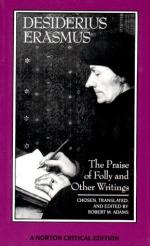|
This section contains 263 words (approx. 1 page at 400 words per page) |

|
Chapters 16 - 17 Summary and Analysis
Chapters 16 and 17 assess a proposed refutation to Folly's previous argument. Some argue that being foolish is an unhappy state, but this argument is mistaken. First, foolishness is man's natural state, and knowing the sciences doesn't make a man happier. There are three general reasons for this: first, many sciences were invented to cause harm to people; second, the peoples of the golden ages didn't have science, yet they lived happily, and third, the silliest of sciences are the ones that men like the most, such as medicine and law, whereas higher sciences like theology and natural science are rejected.
Folly next argues that among the animals, the most foolish are happier than others. Examples include bees, who are both to be admired and happy, horses, which are made worse for working with humans, and cocks, which are naturally happy...
(read more from the Chapters 16 - 17 Summary)
|
This section contains 263 words (approx. 1 page at 400 words per page) |

|




